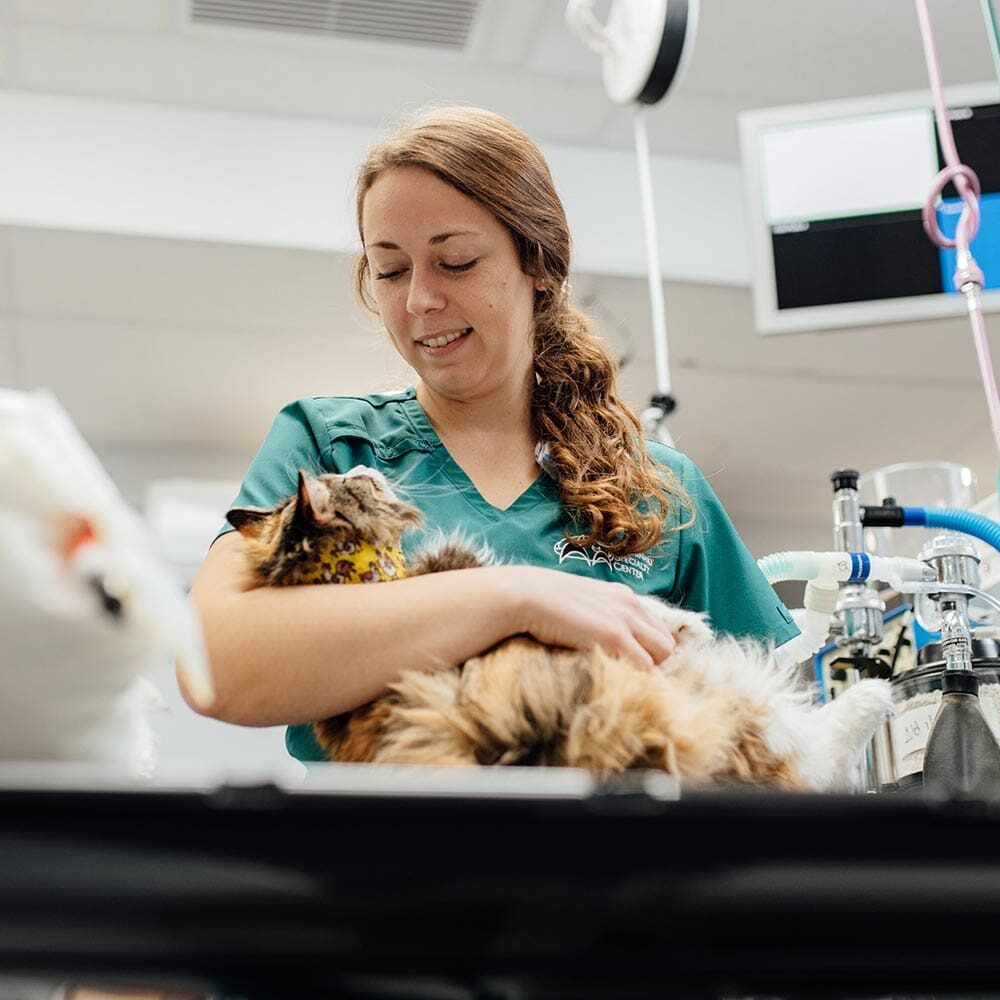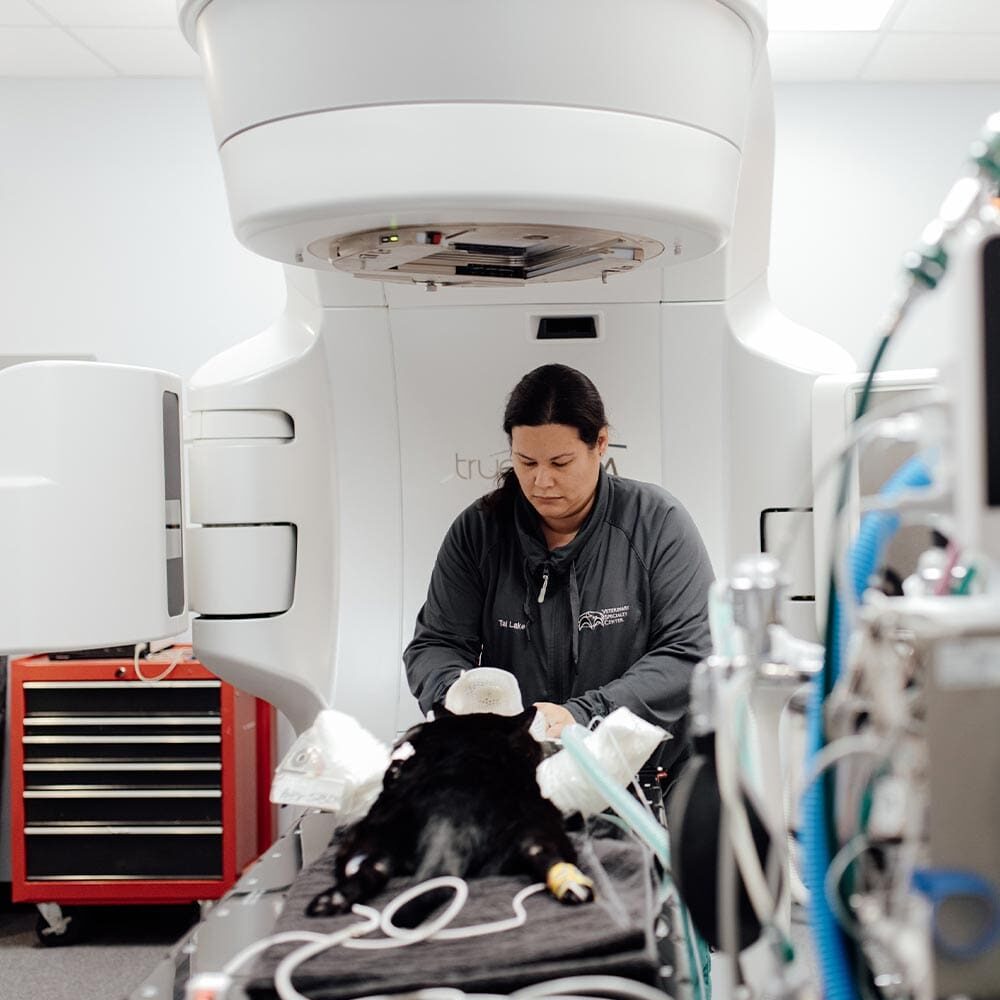Our veterinary oncologists at Veterinary Specialty Center focus on the treatment of pets diagnosed with various forms of cancer, which is more prevalent in pets than most people realize. Cancer is common in middle-aged and older dogs and cats, accounting for almost half of the deaths in pets over 10 years old. While cancer in pets can be a difficult issue to face, the best veterinary oncologists help to offer acute care and comprehensive treatment plans.
Please be aware that if cancer is detected, it does not have to mean a death sentence for your beloved pet. Although the news may be devastating, there are many options to consider that can add quality time to your pet’s life. Our specialized veterinary oncology department in Bannockburn, IL is here to help by walking you through your pet’s options and answering any questions you may have about your pet’s cancer diagnosis, treatment, and prognosis.
What to Expect at an Oncology Appointment


Your pet’s oncologic appointment begins with a consultation, including a physical exam, a review of your pet's history, and a discussion of their condition and treatment options. You'll have the chance to ask questions about the recommended care. Once you agree on a treatment plan, you'll receive a patient care plan with an estimated cost, requiring a deposit at the time of service.
After the initial consultation, our veterinary oncology technicians will be your main point of contact. They will support you and your pet throughout treatment, providing updates from the doctor and offering comfort during challenging times.
What is Cancer?
Cancer is an uncontrolled growth of abnormal cells within the body that can present as a localized tumor, multifocal tumor, or systemic disease.
Tumors are divided and classified into two categories: benign and malignant. Benign tumors tend to be slower growing, are not invasive into the surrounding tissue, and do not spread (metastasize). Malignant tumors tend to have more rapid growth, may invade surrounding tissue, and may spread distantly. Tumors are further classified by the tissue they originate from; carcinomas, sarcomas, and round cells. While surprising to some, cancer in pets is not entirely uncommon, especially among older pets. As your pet ages, it’s important to remain vigilant and bring your pet in for routine check-ups.
Early Warning Signs of Cancer
The following signs are not specific for cancer and may occur with other disease processes as well. If your pet has any of these symptoms, your veterinarian should do a full diagnostic exam to determine what could be causing these symptoms. If something looks unusual or requires further examination, our veterinary oncologists can take a closer look.
-
Abnormal swelling that persists and / or continues to grow
-
Non-healing sores
-
Unexplained weight loss
-
Decreased or loss of appetite
-
Bleeding or abnormal discharge from any body orifice (e.g., mouth, nose, ears, urinary tract or rectum)
-
Recent onset of a persistent offensive odor
-
Difficulty eating or swallowing
-
Decreased or reluctance to exercise
-
Loss of stamina
-
Persistent lameness
-
Increased effort to breathe, urinate, or defecate
If you see signs of illness or cancer in your pet, contact your veterinarian or our veterinary oncologists as soon as possible.


Diagnosing Cancer in Dogs & Cats
Our veterinary oncology team has a highly methodical process for diagnosing cancer in pets. The first step is to obtain a complete history and perform a thorough physical exam which can then lead to the next steps that range from comprehensive laboratory tests to a variety of diagnostic tests. These diagnostic tests allow our veterinary oncologists to gain more acute insight into your pet’s health, and look for any possible signs of cancer.
Some of these tests include:
-
Laboratory tests
Most commonly a complete blood count, serum chemistry panel, and urinalysis
-
Radiographs (X-rays)
-
Abdominal (and possibly cardiac) ultrasound
-
Fine needle aspirates of affected tissue
-
Biopsy of affected tissue
Depending on the location of the affected tissue, this may require minimally invasive surgery or a scope.
Further diagnostic testing may include:
-
CT scan or MRI
-
Nuclear imaging (bone or thyroid scan)
-
Flow cytometry
-
Immunohistochemistry
Our veterinary oncology department uses these tests to gain crucial insight into your pet’s condition and gain a thorough understanding of their health, as well as the risk of cancer. While our veterinary oncologists can help to detect and treat cancer, an informed pet owner can help to reduce exposing pets to additional risk.
Our Treatment Options for Pets with Cancer
The primary goal of the veterinary oncology department at Veterinary Specialty Center is to improve and prolong your pet’s quality of life. When choosing a treatment, it's essential to consider the emotional and financial impact on your family. Our team is here to support you through this process, regardless of your decision.
Once your pet is diagnosed, treatment options may include surgery, chemotherapy, radiation therapy, immunotherapy, or a combination. Collaboration between you, your regular veterinarian, and our veterinary oncologist ensures the best treatment plan for your pet.
Learn more about our cancer treatment options for pets:


If your pet received a cancer diagnosis recently and you have financial concerns, see our Financial Resources page for important information.

